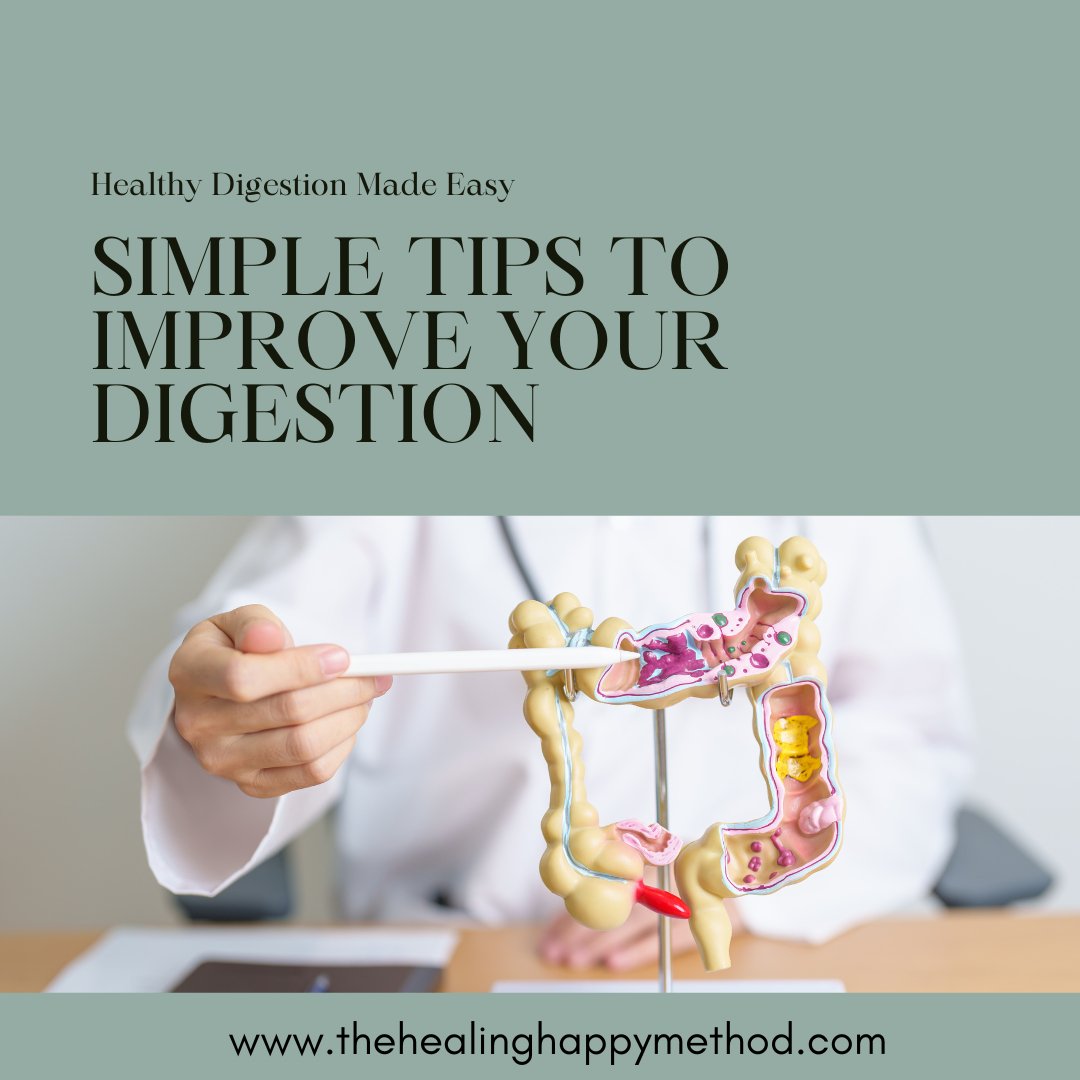Simple Tips Improve Your Digestion Naturally
Everyone experiences occasional digestive symptoms such as upset stomach, gas, heartburn, nausea, constipation or diarrhea.
However, it shouldn't be common and it shouldn't be something you have to suffer with. Here are a few of my favorite ways to help you heal your digestive system.
1. Eat whole foods- fruits, vegetables, whole grains (in their whole state), nuts and seeds.
Whole foods are minimally processed, rich in nutrients, and have super healing powers for your body.
A typical Western diet and processed foods have been linked to an increased risk of developing digestive disorders
Food additives, including glucose, salt and other chemicals, have been suggested to contribute to increased gut inflammation.
Inflammation may impair the barrier function of your intestines, leading to increased gut permeability. It can also lead to unbalancing the microbiome (the gut flora in your digestive tract).
Gut bacteria imbalances have been linked to irritable bowel syndrome (IBS) and irritable bowel diseases like ulcerative colitis and Crohn's Disease. Yeast overgrowth has also been shown to create digestive disturbances. Try a yeast cleanse to help kill yeast overgrowth.
If you have struggled with digestive issues, try using Slippery Elm and Licorice Root powder to soothe and heal the digestive tract. Start by using 5-10 tablespoons of equal parts slippery elm and licorice root powder.
If you have diarrhea, the stomach flu, or if you have eaten too much food, try mixing 1 Tablespoon of Activated Charcoal Powder in 8 oz. of water and drink.
If heartburn or dyspepsia bothers you, try drinking cayenne pepper 20 minutes before you eat. This will aid the stomach in breaking down the food so it won't come back up. This can also help with gastric ulcers.
Peppermint or chamomile herbal infusions can also help soothe the digestive tract.
Focus on not drinking water 20 minutes before or after a meal to allow the digestive juices to maintain their full acidic level to break down food.
Fortunately, scientific evidence suggests that diets high in nutrients protect against digestive diseases.
Therefore, eating a diet based on whole foods and limiting the intake of processed foods may be best for optimal digestion.
2. Get plenty of fiber
It’s common knowledge that fiber is beneficial for good digestion.
Soluble fiber absorbs water and helps add bulk to your stool. Insoluble fiber acts like a giant toothbrush, helping your digestive tract keep everything moving along
Soluble fiber is found in oats, barley, and legumes, while whole grains, nuts, and seeds are good sources of insoluble fiber. Fruits and vegetables can be rich in both soluble and insoluble fiber, so eating a variety of these foods will ensure you’re getting plenty of each type.
Prebiotics are another type of fiber that feed your healthy gut bacteria. Diets high in this fiber have been shown to improve barrier function and reduce inflammation in the gut.
Try eating maca, apple fiber pectin, or organic banana peels as good sources of prebiotics.
3. Add healthy fats to your diet
Good digestion may require eating enough fat. Fat helps you feel satisfied after a meal and is needed for proper absorption of certain nutrients, such as vitamins A, D, E, and K.
Foods that are beneficial include flaxseeds, chia seeds, nuts (especially walnuts).
4. Stay hydrated
Low fluid intake is a common cause of constipation.
Your total fluid intake should come from plain water and foods you eat.
Another way to help meet your fluid intake needs is to include fruits and vegetables that are high in water, such as cucumber, peppers, broccoli, strawberries, apples, and oranges.
5. Manage your stress
Stress can have a negative impact on your digestive system.
It has been associated with stomach ulcers, diarrhea, constipation and IBS
Stress hormones directly affect your digestion. When your body is in fight-or-flight mode, it thinks you don’t have time to rest and digest. During periods of stress, blood and energy are diverted away from your digestive system.
Additionally, your gut and brain are intricately connected — what affects your brain may also impact your digestion, and the sources of food that you are craving. If you eat food while stressed, your body craves food that help you to "numb" out, but are not necessarily healthy. A calm state of mind allows for optimal digestion and healthier food choices.
Try stress management, meditation and relaxation training to improve digestion. Eating with gratitude, acupuncture and yoga have also been shown to improve digestive symptoms.
If you are struggling with a craving, try deep belly breathing, EFT Tapping, or a few yoga poses to improve your mindset and your ability to digest the treat should you choose to eat it.
6. Eat mindfully
Eat in gratitude for everything you put in your mouth, and receive it with joy! It’s easy to eat too much too quickly if you’re not paying attention, which can lead to bloating, gas and indigestion.
To eat mindfully:
- Eat slowly.
- Focus on your food by turning off your TV and putting away your phone.
- Notice how your food looks on your plate and how it smells.
- Select each bite of food consciously.
- Say a prayer or sit in a moment of gratitude for the food you are eating. Then eat it with joy!
- Pay attention to the texture, temperature and taste of your food.
7. Chew your food well!
Digestion starts in your mouth. Your teeth break down the food into smaller pieces so that the enzymes in your digestive tract are better able to break it down.
Poor chewing has been linked to decreased nutrient absorption. The old saying is, "Chew your liquids and drink your solids". This involves swishing liquids in your mouth before swallowing them, and chewing your food so well that it is almost a liquid before you swallow it.
Chewing produces saliva, and the longer you chew, the more saliva is made. Saliva helps start the digestive process in your mouth by breaking down some of the carbs and fats in your meal.
8. Get moving
Movement is one of the best ways to improve your digestion.
Exercise and gravity help food travel through your digestive system. Therefore, taking a walk after a meal may assist your body in moving things along.
Walking and physical movement can help improve constipation symptoms. Gently twisting your body, or intestinal massages can also help with constipation.
9. Pay attention to when you eat
Your body needs time to digest, and gravity helps keep the food you eat moving in the right direction.
10. Try Probiotics
Probiotics are beneficial bacteria that may improve digestive health when taken as supplements.
These healthy bacteria assist in digestion by breaking down indigestible fibers that can otherwise cause gas and bloating.
Try making Rejuvelac. This is a natural probiotic that is alive. You can find the recipe in my book.
The bottom line
Simple diet and lifestyle changes may help improve your digestion if you experience occasional, frequent or long-term digestive symptoms.
Eating a whole-foods diet high in fiber, healthy fat and nutrients is the first step toward good digestion.
Use herbs to aid in healing, and always focus in on receiving your food with joy and gratitude.
Happy Healing!
🧡Shell
Practices such as mindful eating, stress reduction and exercise can also be beneficial.
Finally, changing habits that may affect your digestion — such as smoking, drinking alcohol, and late-night eating — may help relieve symptoms as well.

